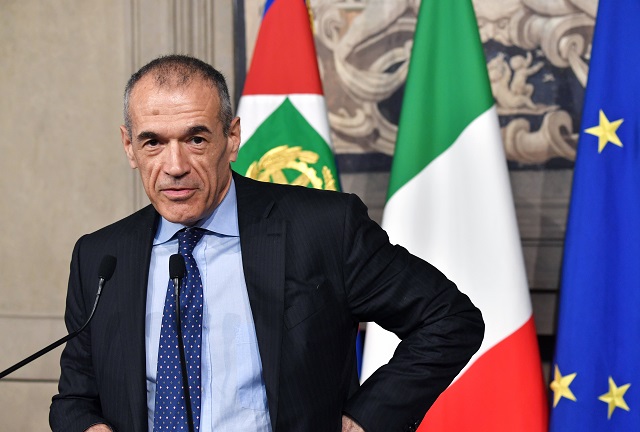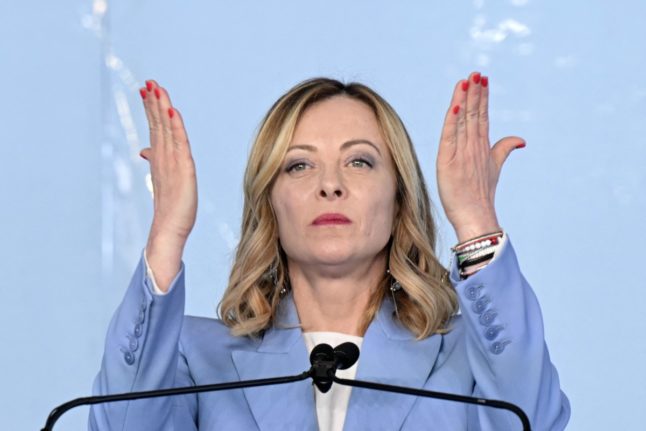Financial markets plunged into a frenzy as Cottarelli was left in charge after efforts to end months of political deadlock hit their latest setback.
President Sergio Mattarella on Monday blocked a cabinet proposed by the anti-immigrant League and their allies in the Five Star Movement (M5S). That left Cottarelli, a former IMF economist known as “Mr Scissors”, tasked with naming a technocrat government. He was expected to present his cabinet to Mattarella within hours.
Five Star and the League, who hold a majority in both houses of parliament, have vowed to reject Cottarelli's proposed technocrat government.
New elections could be held as early as September as the most likely outcome of the political saga sparked by an inconclusive poll in March.
On Sunday evening, the president vetoed the League-Five Star pick for economy minister, eurosceptic Paolo Savona. The populists cried foul and abandoned their joint bid for power.
The fresh uncertainty in the eurozone's third largest economy caused alarm on financial markets. Italy's ten-year bond yields surged to over 300 basis points higher than Germany's on Tuesday morning – a sign of surging investor doubts over Italy's financial stability.
The Milan stock exchange plunged more than three percent on Tuesday morning. The euro also fell in Asian trade on Tuesday and was in danger of falling below the $1.16 level last breached in early November.
- RECAP: How did Italy end up in political crisis?
- Who is Carlo Cottarelli, the technocrat set to be Italy's next PM?
- Who is Sergio Mattarella, Italy's 'political referee'?
Mattarella's veto and subsequent nomination of Cottarelli as caretaker prime minister sparked angry calls for the president's impeachment, since most lawmakers backed Savona.
Mattarella said that an openly eurosceptic economy minister was counter to the parties' joint promise to simply “change Europe for the better from an Italian point of view”. Savona has called the euro a “German cage” and said that Italy needs a plan to leave the single currency “if necessary”.
League leader Matteo Salvini, a fellow eurosceptic who was Savona's biggest advocate, said his side's joint plan for a government failed because of pressure from the “powers-that-be, the markets, Berlin and Paris”.
“This isn't democracy, this isn't respect for the popular vote. It's the latest slap in the face,” Salvini said, from those that say “Italy should be a slave, scared and precarious”.
Five Star chief Luigi Di Maio called on party supporters to attend a rally in Rome on Saturday, the anniversary of Italy's transformation into a republic in 1946, after what he called “Italian democracy's darkest night”.

Five Star Movement leader Luigi Di Maio. Photo: Andreas Solaro/AFP
Elections 'after August'
Cottarelli, 64, was director of the International Monetary Fund's fiscal affairs department from 2008 to 2013 and became known as “Mr Scissors” for his public spending cuts in Italy.
He said that should his technocrat government win parliamentary approval, it would stay in place until elections at the “start of 2019”.
But if parliament fails to approve his government, a new election would be held “after August” – the most likely outcome given the populists' strength in parliament. Only the centre-left Democratic Party has announced that it would vote in favour.
READ MORE: What's next for Italy after proposed populist government collapse?
Salvini and Di Maio furiously denounced the presidential veto, blasting what they called meddling by Germany, debt ratings agencies, financial lobbies and even lies from Mattarella's staff.
“Paolo Savona would not have taken us out of the euro. It's a lie invented by Mattarella's advisors,” Di Maio said in a live video on Facebook. “The truth is that they don't want us in government.”
Elections could benefit Salvini, however, as recent polling by IndexResearch put the League at 22 percent, five points up from their vote share in the March 4th ballot.
Impeachment 'almost certain'
Under the Italian constitution, the president nominates both the prime minister and, following proposals from the premier, the cabinet. The most famous example of a president denying a PM's choice was in 1994 when Eugenio Scalfari refused then prime minister Silvio Berlusconi's choice of his own lawyer, Cesare Previti, as justice minister.
However, Di Maio said that Mattarella, himself a former constitutional court judge, had “gone beyond his legal prerogatives”. He said an impeachment trial for Mattarella, 76, would be “almost a certainty”.
Most analysts however say impeachment is only possible in cases of “high treason” or constitutional breaches.
“President Mattarella has only exercised his constitutional powers”, said Massimo Luciani, president of the Italian Constitutionalists Association.
READ MORE: How much power does the Italian president actually have?
By Lucy Adler




 Please whitelist us to continue reading.
Please whitelist us to continue reading.